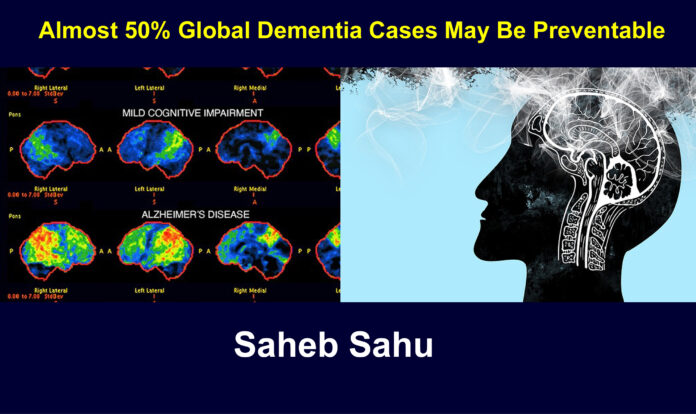Dr Saheb Sahu, FAAP, MPH.
What is Dementia?
Dementia is a general term used to describe a decline in cognitive function severe enough to interfere with daily life. It is not a specific disease but rather a syndrome, a group of related symptoms associated with a decline in memory, reasoning, or other thinking skills. Alzheimer’s disease is the most common cause of dementia, but there are other types as well, including vascular dementia, Lewy body dementia, and frontotemporal dementia. Common symptoms of dementia include:
1. Memory Loss: Difficulty in remembering recent events or information.
2. Difficulty with Communication: Trouble finding right words or understanding language.
3. Impaired Reasoning or judgment: Difficulty making decisions or solving problems.
4. Disorientation: Confusion about time, place, or identity.
5. Changes in Mood or Behavior: Unexpected mood swings, irritability, or apathy.
Dementia is progressive, meaning symptoms start out mild and gradually worsen over time. It is most common in older adults, but it is not a normal part of aging. Diagnosis and management involve a combination of medical evaluations, cognitive tests, blood tests, and sometimes brain imaging like- MRI, CT scan or PET scan. Currently there is no cure for dementia. Multiple drugs are under trials. Treatments and lifestyle changes can help manage symptoms and improve quality of life.
Preventive Measures
In 2020, the Lancet Commission on Demetria (published in the medical journal Lancet) determined 12 modifiable risk factors that are known to put people at higher risk of developing dementia. These are:
1. Physical inactivity
2. Smoking
3. Excessive alcohol consumption
4. Air pollution
5. Head injury
6. Infrequent social contact
7. Less education
8. Obesity
9. High blood pressure
10. Diabetes
11. Depression
12. Hearing loss
In 2024, the same commission added two more factors to the list.
13. High bad cholesterol (LDL) after age 40
14. Untreated vision loss
According to the report, these 14 factors account for 49% of dementia cases across the world.
How can you lower your dementia risks?
You should choose a primary care doctor who understands your health and is willing to share pertinent information with other specialists like cardiologist (heart specialist) and neurologist (brain and nerve specialist). He or she will help you to stay on the top of any issues putting your well-being at stake. Your primary care doctor should be proactively working to help you control the above mentioned risk factors. You and your doctor should focus on these lifestyle changes as early as possible, at least in midlife, not when dementia starts to show up. There are also some tests that can detect early signs of dementia and genetic markers of some brain diseases causing dementia.
It is never too late to make changes and correction in your lifestyle (not smoking, not drinking, exercising, being socially active, using hearing aid and glasses if needed, treating high blood pressure, high cholesterol, diabetes, depression etc.), whether you are young, seemingly healthy person, in your 80s or 90s or someone who has already been diagnose with dementia. Recent studies have clearly established that, our brains are highly malleable. So if you decide to make healthy lifestyle changes at any point, your brain will respond and be healthier for it. SO START TODAY.
Sources:
1 – Medscape Medical News. Almost 50% Global Dementia Cases May Be Preventable. July 31, 2024
2 – Jullian Wilson. Researchers Have Discovered 2 new Dementia Risk Factors. Huffpost, Aug12, 2024



